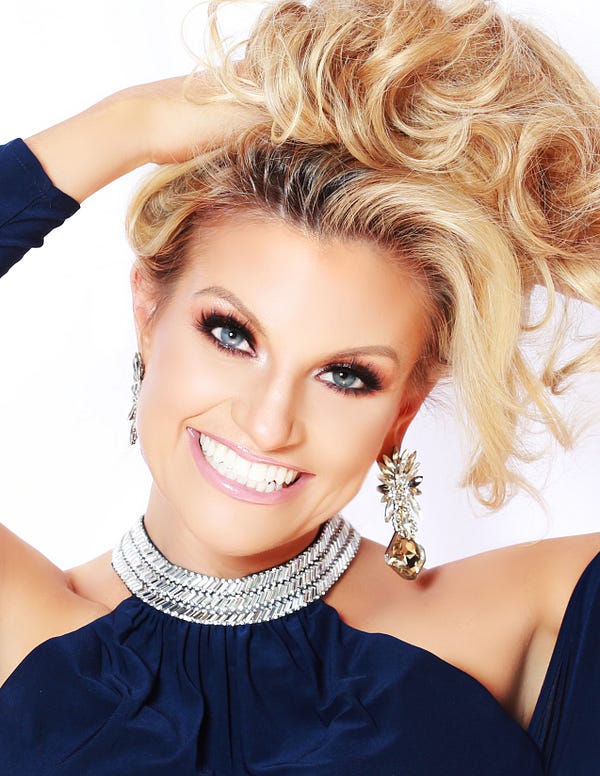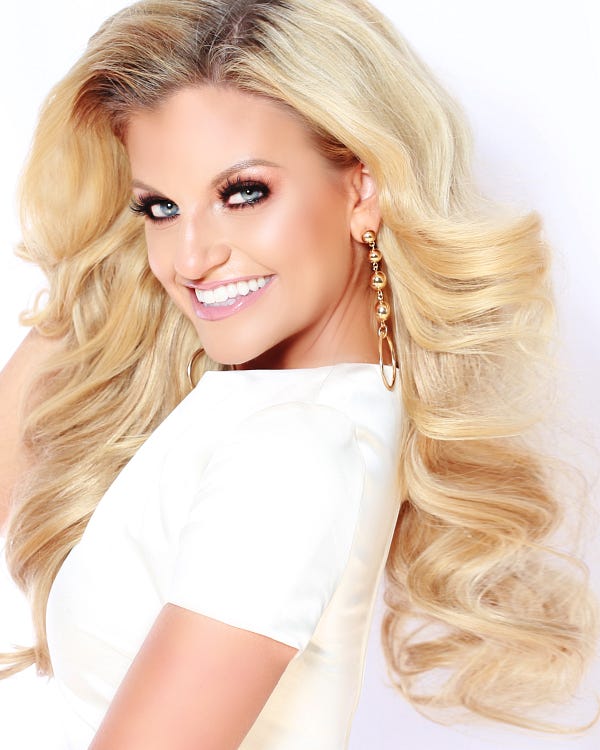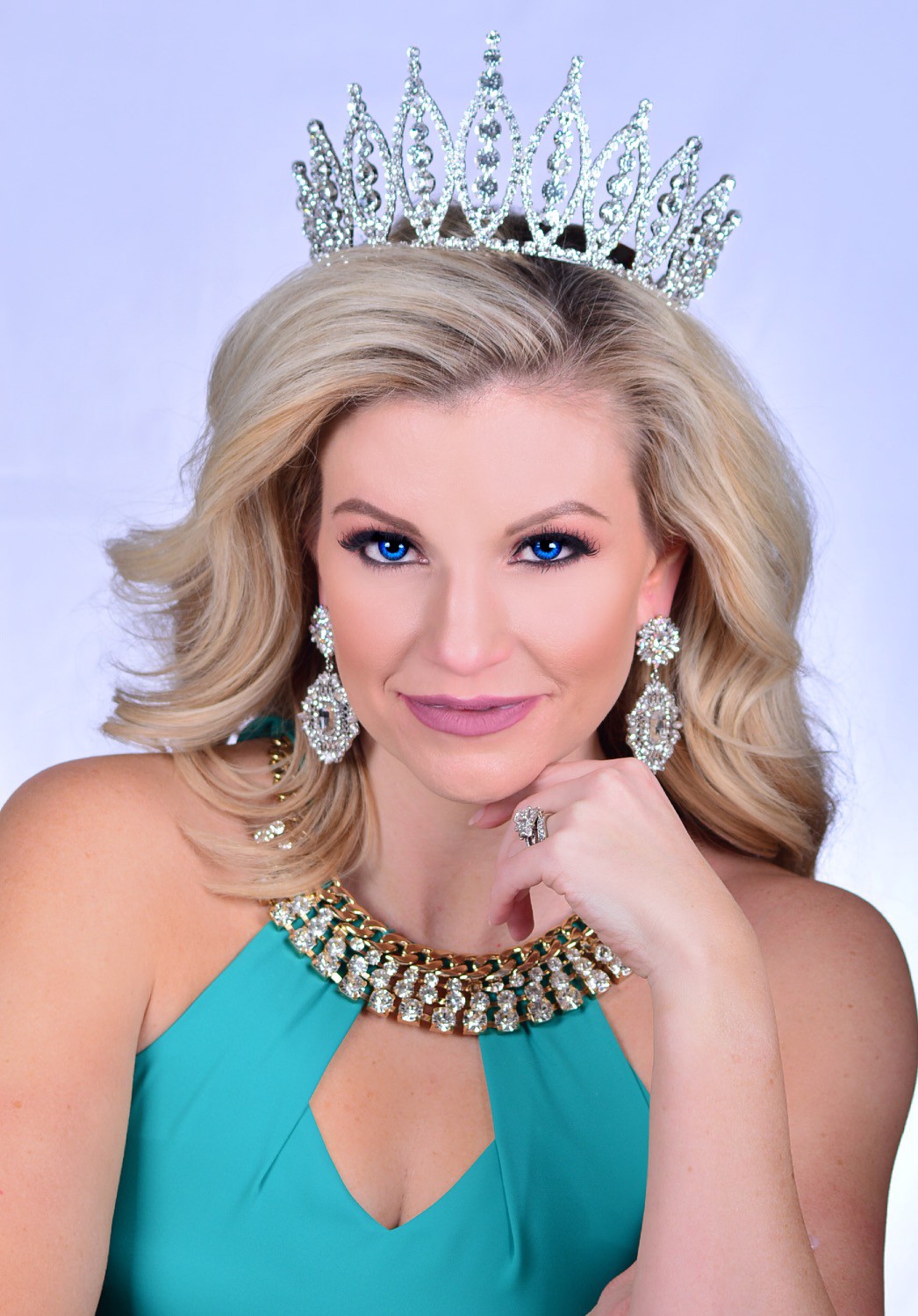“You are going to be so pretty when you lose the baby fat.” These were the words that change my life. A close family member said these words to me at a family reunion when I was 12 years old. I came home and went on my first diet. That diet quickly spiraled into a full blown eating disorder….”
As a part of my interview series with public figures who struggled with and coped with an eating disorder, I had the pleasure to interview Rebekah Wheeler. Rebekah loves rhinestones, recipes, healthy hacks, fitness, positive self-image, and all things girly. She grew up in Canadian, Texas and earned her Bachelor’s degree in Broadcast Journalism from Oklahoma State University in 2006. Rebekah is married to her handsome husband, Dustin and together, they have two young boys. She now works in the oil and gas industry as a Senior Division Order Analyst and Owner Relations Coordinator. Rebekah was recently crowned Mrs. Oklahoma International 2019.
A recovering eating disorder survivor, she is passionate about healthy eating and fitness, promoting self-love, and believing You Are Enough. She is a National Ambassador for Project HEAL, a member of the board for the Oklahoma Eating Disorders Association, the founder of the You Are Enough Movement, and shea lead the 2019 OKC NEDA Walk. Rebekah is serving in her ninth year as a member of the Oklahoma City Junior League and loves to run 5Ks in the community.
She loves brunch with friends, hot yoga, true-crime podcasts and spending quality time with her family.
Thank you so much for doing this with us! Can you tell our readers a little bit about yourself and what you do professionally?
Thanks so much for having me! Most recently, I was crowned as Mrs. Oklahoma International 2019. Now that I have a sparkly crown on my head, people have a lot of questions about the whole pageant thing, my backstory, and how I balance being a titleholder and being a wife, a mom, and a career.
I grew up in a small town in Texas and always wanted to move to the big city. After college, I did just that. Oklahoma City is a thriving place to be and is the heart of the oil and gas industry. I have a journalism degree so a career in oil and gas was not on my radar originally! The first major company I worked for after college was a prominent operator in the industry. In my eight years at that company, I moved from an entry level position to becoming the manager of my department, leading a team of three supervisors and 41 total team members. I’ve now moved to a smaller company and handle owner relations and division orders.
I’ve been married to my husband for almost 11 years and we have two sons. Balancing our marriage and the kids’ activities with my career has been one of the things people ask about often. I am thankful to have such a great partner in life and parenting who makes this entire thing possible and who is the backbone and IT and marketing genius behind the You Are Enough Movement, our passion project to promote hope and healing, positive self-image and eating disorder awareness.
Thank you for your bravery and strength in being so open with us. I personally understand how hard this is. Are you able to tell our readers the story of how you struggled with an eating disorder?
“You are going to be so pretty when you lose the baby fat.” These were the words that change my life. A close family member said these words to me at a family reunion when I was 12 years old. I came home and went on my first diet. That diet quickly spiraled into a full blown eating disorder and I spent the next 10 years starving myself, binging and purging, over exercising, restricting myself, and counting every single calorie that went into my mouth.
My best friend tried to stage an intervention during middle school after I collapsed at camp due to not eating and the heat. I am so thankful that she looped my mom in to the situation. I am sure my parents had noticed things going on, but it was the wake-up call we all needed that this had gotten very serious.
I lapsed in and out of recovery all throughout high school and college, but I remember only a few weeks of my entire youth where I felt fully ‘free’ from my eating disorder. It was consuming. I thought about food, weight, my body, and my shame constantly.

What was the final straw that made you decide that you were going to do all you can to get better?
My body started shutting down. I didn’t have a menstrual cycle for many months and I knew that the long-term damage I was doing was possibly irreparable. I met my husband shortly afterward this and I knew I had to fight for myself. If he could love me for the person I was inside, I knew I had to learn to love myself. I started fighting for me. I started learning ways to cope with my triggers. I began to heal.
And how are things going for you today?
Today, I can proudly say, I am in recovery and have been for 12 years! I still have days that are hard and days where I faintly hear the whispers of my old eating disorder calling out to me, but now, I have the tools to shut it out and shut it down.
In 2015, my husband and I founded the You Are Enough Movement to share my story and offer hope and healing to others. We sell merchandise on our site and the proceeds go to the eating disorder nonprofit, Project HEAL and to fund our Hope boxes that are sent out to those needing hope and healing.
Based on your own experience are you able to share 5 things with our readers about how to support a loved one who is struggling with an eating disorder? If you can, can you share an example from your own experience?
1. Just listen. Be there for your loved one and be a shoulder to cry on or a friend to laugh with.
2. Understand that recovery is not linear. Every day won’t be a good day and that’s okay. It doesn’t mean that they aren’t working towards healing.
3. Don’t talk about weight, bodies, and food constantly. You’d be shocked how much the diet culture is ingrained in our lives. I have had to unfriend, unfollow, and remove triggering people from my life because I can’t be around the constant diet talk and comparison game.
4. When they say they need help, take it seriously. Sometimes, I don’t think people realize their loved ones are as sick as they truly are because they LOOK okay. Eating disorders don’t have a certain size or weight. It’s a mental disorder.
5. Be a voice of hope. Positivity is seriously the best thing you can receive when you are struggling with an eating disorder or any other mental disorder.
Is there a message you would like to tell someone who may be reading this, who is currently struggling with an eating disorder?
I have people reach out to me often who are struggling with eating disorders and haven’t sought out professional help. I am sometimes the first person they have told that they are struggling. The firstthing to know is that there is hope and you are not alone. There are many resources available including free online recovery groups and the NEDA helpline (1–800–931–2237).
I also want you to know if you are struggling that recovery takes time and is not a linear journey. There are good days and there are hard days, but keep fighting for yourself. You are enough. You are worth fighting for.
According to this study cited by the National Association of Anorexia Nervosa and Associated Disorders, at least 30 million people in the U.S. of all ages and genders suffer from an eating disorder. Can you suggest 3–5 reasons why this has become such a critical issue recently?
The comparison game is real. Social media, filters, and editing apps drive us all to look a certain way and live a certain lifestyle. We put so much pressure on ourselves and mental disorders manifest in different ways. As Mrs. Oklahoma International 2019, I use my social media to post all the different aspects of my life — the glam, but also the everyday, the unfiltered, the unedited.
The diet culture is also a $60 billion dollar industry in America. It’s in our faces constantly to try this diet or lose ten pounds quick. When we hear that diet talk non-stop, it’s almost impossible to avoid triggering thoughts! In my career, I work primarily with men, which has been really great for my mindset and avoiding some of the diet talk, but lately, I’ve noticed it happening more and more in the breakroom and workplace conversations. I make conscious efforts to make the discussion about health versus weight.
My gut feeling says that the rise in eating disorders recently comes from the pressure we are putting on ourselves as people to do it all. We are busier than ever with little to no downtime. Taking time to slow down, meditate, journal, do yoga, take walks, and disconnect is so good for our mental health. And is directly linked to a better relationship with our overall health. I am an advocate for total body health and believe we will see a decrease in eating disorders when we disconnect, slow down, and take time to breathe.
Based on your insight, what are concrete steps can a) individuals, b) corporations, c) communities and d) leaders do to address the core issues that are leading to this problem?
As individuals, we have to stop the comparison game and the diet talk. As a woman, I hear it come up in conversation almost once a day at some point. Instead of focusing on physical looks, let’s complement each other on the their kindness, their humor, their giving spirit, their amazing art abilities, or whatever else makes them incredibly unique and talented.
As corporations, adding in programs focused on mental health, yoga, walking, and work/life balance is a must in this ‘do-it-all world.’ I know in my management role, I often would be checking and answering work emails at 10 PM before I went to bed and again first thing when I woke up at 4:30 AM. I would love to see companies implement a policy of not sending emails after 7 PM unless they were absolutely critical. If a company truly wants to see work/life balance, this would be a step in the right direction.
As a leader, my goal is to be a role model for young girls and those who look to me that I am not perfect, but I am perfectly made. I am real, I am human, I am enough.
As you know, one of the challenges of an eating disorder is the harmful and dismissive sentiment of “why can’t you just control yourself”. What do you think needs to be done to make it apparent that an eating disorder is an illness just like heart disease or schizophrenia?
Starting the conversation and raising awareness about eating disorders and sharing the facts about eating disorders are really helpful in ending these types of conversations. Many people who are struggling don’t look sick. Many people who have eating disorders are in a healthy weight range. Eating disorders don’t have a size or a number. We have to educate the public about eating disorders and I’m really thankful to have a chance to do interviews like this and share this type of information with a global audience.

What are your favorite books, podcasts, or resources that have helped you with your struggle? Can you explain why you like them?
My go-to book in my recovery is the Bible. I also love the book The Best Yes about balancing commitments and being a chronic overachiever. I am a podcast junkie — I really love The Chalene Show, Happier with Gretchen Rubin, the Next Right Thing, and That Sounds Fun. These podcasts are all really uplifting, inspiring, positive, motivating, and great reminders that life is about so much more than the way we look on the outside!
Can you please give us your favorite “Life Lesson Quote”? Can you share how that was relevant to you in your life?
“Challenges are what make life interesting and overcoming them is what makes life meaningful.” — Joshua J. Marine
While I was struggling with my eating disorder, I was angry. I didn’t understand why I was going through this and why I couldn’t just stop. I wanted to end it and I wanted to get over it. I prayed that I could quit. It wasn’t that easy. Today, I look back to those years and I see that overcoming that awful dark time in my life has made me into the woman I am today. I am the joyful and triumphant person I am now because I beat ED. I won. And I am enough.
Are you working on any exciting new projects now? How do you think that will help people?
One of the coolest things about being Mrs. Oklahoma International 2019 is getting to compete at Mrs. International! I get to meet women from all over the world and will travel to West Virginia in July for the international pageant. I’m excited to meet these new friends and connections and have the opportunity to share the message of eating disorder awareness, positive self-image and the You Are Enough Movement with the judges and women from the entire world.
We also just launched the Hope Box as part of the You Are Enough Movement. These are boxes sent to treatment centers and directly to people who need hope. They are filled with a YAE shirt, a journal, a note from me, and other goodies to bring hope to those in times of struggle. You can donate a Hope Box to a recovery and in-patient treatment center through the website or send one to a friend.

You are a person of great influence. If you could inspire a movement that would bring the most amount of good to the largest amount of people, what would that be? You never know what your idea can trigger. 🙂
I like to think the You Are Enough Movement is doing just that! Spreading the message and truly embracing the idea and belief that you are enough — today, just as you are, goes against today’s filtered and photo-shopped world. As a pageant titleholder, I do have a lot of glamorous moments and photos, but I also post the everyday reality, as well. You are enough however you show up. Just show up and keep showing up.
How can our readers follow you on social media?
You can find me most actively on Instagram at @iamrebekahwheeler and @youareenoughmovement and also on the website www.youareenoughmovement.com!
Thank you so much for these insights! This was so inspiring!
About the Author:
Originally from Israel, Limor Weinstein has been anorexic and bulimic, a “nanny spy” to the rich and famous and a Commander in the Israeli Army. Her personal recovery from an eating disorder led her to commit herself to a life of helping others, and along the way she picked up two Master’s Degrees in Psychology from Columbia University and City College as well as a Post-Graduate Certificate in Eating Disorder Treatment from the Institute for Contemporary Psychotherapy.
Upon settling in New York, Limor quickly became known as the “go to” person for families struggling with mental health issues, in part because her openness about her own mental health challenges paved the way for open exchanges. She understood the difficulties many have in finding the right treatment, as well as the stigma that remains so prevalent towards those who are struggling with mental health issues. She realized that most families are quietly struggling with a problem they’re not comfortable talking about, and that discomfort makes it much less likely that they will get the help they need for their loved ones. She discovered that being open and honest about her own mental health challenges took the fear out of the conversations. Her mission became to research and guide those families to the highest-quality treatment available. Helping others became part of her DNA, as has a commitment to supporting and assisting organizations that perform research and treatment in the mental health arena.
After years of helping families by helping connect them to the right treatment and wellness services, Limor realized that the only way to ensure that they are receiving appropriate, coordinated and evidence-based care would be to stay in control of the entire treatment process. That realization led her to create Bespoke Wellness Partners, which employs over 100 of the best clinicians and wellness providers in New York and provides confidential treatment and wellness services throughout the city. Bespoke has built its reputation on strong relationships, personalized, confidential service and a commitment to ensuring that all clients find the right treatment for their particular issues.
In addition to her role at Bespoke Wellness Partners, Limor is the Co-Chair of the Academy of Eating Disorders. She lives with her husband, three daughters and their dog Rex in Manhattan.
To sign up for our newsletter, or learn more about custom mental health, click here.


